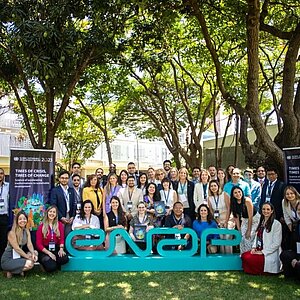Transitioning to Circular Cities

Experts discussed the opportunities to accelerate the transition to a circular economy at a virtual side event at the HLPF 2023.
The virtual side event "Transitioning to Circular Cities: Where to Focus and Why?" took place on Monday, 10th of July in the scope of this year's High-Level Political Forum (HLPF). The official side event assessed the performance of existing circular economy strategies in Latin American, Chinese, and European cities and brought together policymakers, stakeholders, and experts to discuss research findings and explore ways to accelerate the transition by expanding partnerships. The event was organized by the Stockholm Environment Institute (SEI) and the Deutsche Gesellschaft für Internationale Zusammenarbeit (GIZ) GmbH on behalf of the German Federal Ministry for the Environment, Nature Conservation, Nuclear Safety and Consumer Protection (BMUV) within the framework of the International Climate Initiative (IKI).
The event was opened by Verónica Tomei, Division Head at the Federal Ministry for the Environment, Nature Conservation, Nuclear Safety and Consumer Protection (BMUV) through a video message. Ms Tomei highlighted Germany's commitment to the circular economy and emphasized the Colombian-German and Sino-Chinese cooperation in this context.
Research
Fedra Vanhuyse, Head of Division Societies, Climate and Policy Support at SEI, presented research findings on circular economy transitions in cities. Research shows that more cities are embracing circular economy transitions, with a primary focus on recycling and energy recovery from waste. Vanhuyse emphasized the need to consider potential unintended consequences of circular economy efforts, such as rebound effects. Recommendations for further research reflect the importance of increased participation, rights-based approaches, and the need to expand circular economy approaches beyond managing waste.
Case Studies

Carolina Urrutia, District Secretary for the Environment in the Mayor’s Office in Bogotá, Colombia, presented the "Bogotá Circular" action program. The program adopts a whole-system approach, focusing on improving natural capital, full system efficiency, and combining circularity with social aspects. Urrutia highlighted the challenges of linear processes, unsustainable habits, and the disconnection between regulatory and economic instruments. Bogotá's multi-stakeholder platform, which includes public and private sectors, addresses these challenges through research, regulations, data management, and governance and funding actions. Urrutia shared an example of the Accelerator project's Circular Fashion Network, which promotes eco-design, repair, sustainable consumption, and materials recovery.

Kang Lei, Vice President of Tianjin Research Academy of Ecological and Environmental Sciences in China, discussed the achievements and tasks of circular economy development in the city. Tianjin aims to create an urban recycling system, expand recycling in industrial parks and the agricultural and service sectors, and promote circular development in the Beijing-Tianjin-Hebei region. Key directions for circular economy development in Tianjin include green design for key products, circular production models, cleaner production practices, and comprehensive utilization of industrial bulk solid waste. Kang Lei also emphasized the importance of structural reforms and public awareness in achieving carbon neutrality and zero-waste goals.
Panel Discussion and Closing Remarks
Zhu Shu, Regional Director and China Representative from ICLEI emphasized the need for a whole society approach to circular economy strategies in China. Zhu highlighted the promotion of zero-waste cities, green factories, and circular industrial clusters in China's 14th five-year plan. Collaboration between the public and private sectors, as well as public procurement, were identified as crucial areas for driving circular economy transitions. Zhu highlighted the potential for China to learn from European circular economy approaches and the importance of building connections between the two regions.
In closing remarks, Katja Suhr, head of the Circular Economy Team at GIZ, drew on the significance of looking beyond city borders and fostering innovation to drive systemic change. She emphasized the role of circular economy platform labs as spaces for experimentation, exchange between sectors, and the need to benefit all stakeholders when transitioning towards the circular economy. Suhr also highlighted the power of green public procurement and the importance of incorporating the true price of primary resources into circular economy approaches.
Conclusion
The HLPF 2023 virtual side event shed light on the progress, challenges, and opportunities associated with transitioning to circular cities. The event's presentations and discussions emphasized the need for a comprehensive approach, increased collaboration between stakeholders, and the integration of social aspects in circular economy strategies. Successful case studies from Bogotá and Tianjin demonstrated the potential for urban circular economy strategies to address environmental, economic, and social challenges. By learning from one another's experiences and fostering global collaborations, cities can accelerate the transition towards the sustainable and circular future we need.
The link has been copied to the clipboard
Contact
IKI Office
Zukunft – Umwelt – Gesellschaft (ZUG) gGmbH
Stresemannstraße 69-71
10963 Berlin
Further information
Recording of the event: Transitioning to circular cities: where to focus and why?
Related Publications
-
 04/ 2016 | Country Profile
04/ 2016 | Country ProfileClimate Protection in China
Englisch | English (PDF, 477 KB)
Chinesisch | Chinese (PDF, 745 KB)













